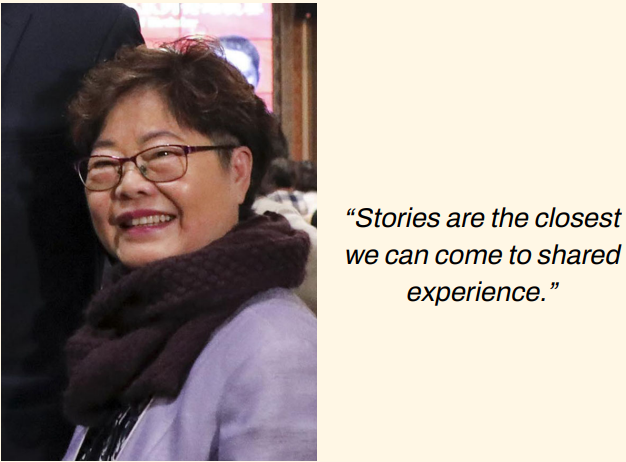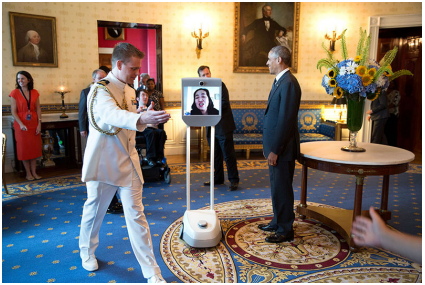19.2: Trailblazer
- Page ID
- 142570
Podcast Trailblazer: Alice Wong

Figure \(19.5\) Alice Wong, 2017 (credit: “Alice Wong” by Andrew Scheer/Wikimedia Commons, CC 1.0)
The Disability Visibility Project
Alice Wong (b. 1974) is an activist, writer, and media creator from San Francisco, California. After graduating from Indiana University in 1997 with majors in English and sociology, Wong went on to earn a master’s degree in sociology from the University of California, San Francisco, where she later worked. Wong has been widely published, including feature pieces appearing in publications ranging from the New York Times to Teen Vogue, and her activism work has been featured in CNN’s series United Shades of America (https://openstax.org/r/ Unitedshades). In addition to writing, Wong regularly creates multimedia content, including podcasts. From 2013 to 2015, she was a member of the National Council on Disability, appointed by then president Barack Obama.

Figure \(19.6\) In this photo taken in 1990, Alice Wong participates via robot in the 25th anniversary celebration of the Americans with Disabilities Act. (credit: “Alice Wong participated at the 25th anniversary of the Americans With Disabilities Act via robot” by Pete Souza/The White House/Wikimedia Commons, CC0)
Wong founded and serves as the director of the Disability Visibility Project (DVP), an online community that aims to create a space where disability media and culture are recognized, created, and shared. The project is personal for Wong, who has been unable to walk since childhood. The DVP also provides an online place for people to share and connect about disability culture. The organization encourages those living with disabilities to share their stories through the website or the app StoryCorps (https://openstax.org/r/storycorps), which collects and shares oral history. The DVP curates “disabled media” from these collected oral histories in the form of tweets, audio clips, podcasts, blog posts, images, and so on. The project also publishes original written and multimedia content created from the perspectives of people who are disabled. Topics include issues related to ableism (discrimination against people with disabilities), culture, and politics.
Wong is also the host and a coproducer of the Disability Visibility Project podcast (https://openstax.org/r/ Disability_Visibility), launched in 2017. She uses the podcast to give a voice and platform to issues concerning politics and culture as they relate to disability rights and social justice. Through conversations with diverse guests, Wong amplifies disability media and culture on topics ranging from health care to climate change to the arts, and everything in between.
Wong has also partnered with #CripTheVote (https://openstax.org/r/CriptheVote), a nonpartisan campaign to bring awareness of disability issues into the public and political arenas, and Access Is Love (https://openstax.org/r/accessislove), an initiative to build accessibility into everyday life. She is the editor of Disability Visibility: First-Person Stories from the Twenty-First Century, an anthology of personal stories from members of the disability community. The book contains curated text such as blog posts, manifestos, eulogies, and testimonies to Congress in order to bring to light the diverse experiences of people in this community. The aim of the anthology is intersectional, meaning it emphasizes the crossroads of living with disabilities and other issues, including race, class, gender, culture, and religion.
Discussion Questions
- Why might Alice Wong look to speech and other media to communicate activist ideas surrounding the disability community?
- How is the impact of writing for speech different from writing for print? What comes across when an activist speaks rather than represents their ideas in print?
- How does social media both enhance and limit accessibility within the disabled community? How is this true for other cultural communities?
- Wong says that storytelling can be more than written words. How can other forms of media—she lists emojis, memes, selfies, and tweets—communicate rhetorical ideas as effectively as, or more effectively than, traditional written storytelling?


